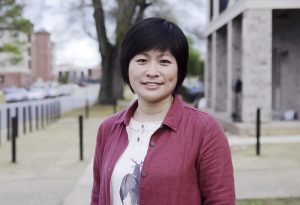
TUSCALOOSA, Ala. — Wenjie Chai has spent a considerable amount of time caring for her children and her elders in the countryside of the Anhui Province of China.
It’s common for those who live in rural areas to travel significant distances to work in metro areas, where jobs are abundant and pay is higher. Children and the elderly, who often live with their working-age family members, spend stretches of time alone. Combined with an underdeveloped social work infrastructure, chronic health conditions and child safety are prevalent in these rural areas.
“In China, the environments and living conditions in the countryside and in the city are very different,” said Chai, who is a visiting scholar in The University of Alabama School of Social Work. “Many children are left behind by their parents, so they have to live with their grandparents or other relatives. Sometimes they are neglected, and almost every summer, there are children who drown in rivers.”
Chai will focus her time at UA studying welfare of children and families and community development. She arrived in Tuscaloosa in early December for her one-year stay as a visiting scholar, the latest international visitor in the school’s commitment to help shape social work education across the globe.
Chai is sitting in on a mixture of undergraduate and graduate courses, including child welfare, aging and research methods. She hopes to visit nongovernment organizations in the state to learn more about how they’re organized, managed and funded. Chai is a full-time teacher and works part-time at an NGO in China.
“The developing of nongovernment social work agencies is new in China,” Chai said. “There are many fields in which our government cannot do enough, so those families and the children need more help. More and more NGOs in China have many problems, like how to manage these organizations. Most have no professional full-time workers and rely on volunteers who already have full-time jobs and a salary.”
Chai is eager to apply the knowledge gained at UA once she returns to China, where she’s exploring the possibility of pursuing an advanced degree in social work. Chai, like many in the country who hold significant roles in social work education, does not have an undergraduate or master’s degree in social work. Chai has a two degrees in history.
“Because of social work education’s youth in China, there are many people who have little or no formal background in social work,” said Dr. Debra Nelson-Gardell, associate professor and coordinator of International Programs in the school. “They have affiliated kinds of background, like history, economics, and so on. What else is different about [Chai] is that, while she is considering pursuing a Ph.D. in social work, she has taken a greater apparent interest in the teaching of social work than some of our other visiting scholars have done. One significant goal of the China Collaborative was to offer whatever we could to assist in the development of the infrastructure of graduate social work education in China. This very sincere interest from Chai is in line with that.”
Chai said social work professors in China must have experience as a visiting scholar abroad. She said the social work education experience in the United States differs greatly, mainly in how field education is built into course curriculum.
Chai said her pursuit of social work education is equal parts “must” and “want-to.”
“Many are making the same transition as me,” Chai said. “I’m very interested in the children that are left behind in the countryside [the social work issue of particular interest].”
The UA School of Social Work, along with six other universities around the United States, is entering the final year of a five-year Council of Social Work Education collaborative program with universities in mainland China. UA has worked directly with Yunnan University to help develop teaching resources for master’s-level social work programs. The partnership has also provided faculty exchanges and research collaborations.
“Jie is actually not from that geographic area we were assigned to,” Nelson-Gardell said. “So this collaborative has resulted in UA’s name being much more recognizable in the Chinese social work education community. People know about us because of the collaborative, which is very exciting.
“Working with the China Collaborative and our visiting scholars certainly keeps my passion for international work ignited. I learn more and more about Chinese social work – we have the same social issues: children in need of care, rural poverty, fair resource access for racial and ethnic minorities – so my own knowledge and cultural experiences are enhanced.”
Contact
David Miller, UA Media Relations, 205/348-0825, david.c.miller@ua.edu
Source
Wenjie Chai, visiting scholar, School of Social Work, wchai@ua.edu
